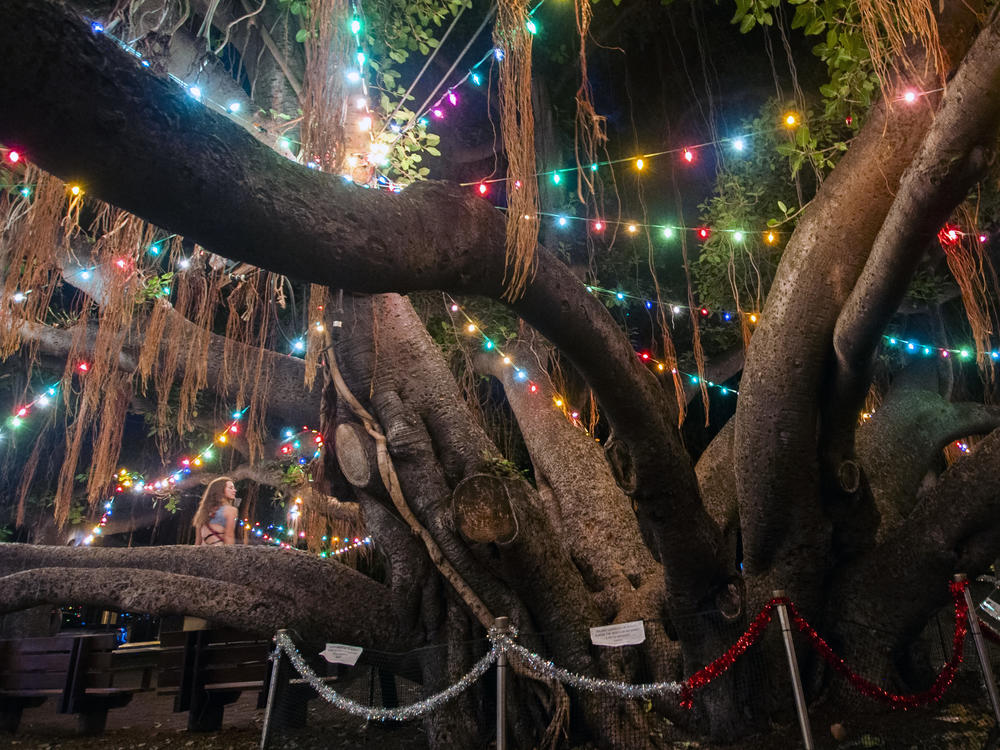Section Branding
Header Content
Scorched by Maui wildfire, historic Lahaina banyan tree appears still standing
Primary Content
For 150 years, an enormous banyan tree has stood at the center of the Maui town of Lahaina. Now, that tree appears to be badly charred by wildfire that has killed at least 36 people. But it's still standing.
Lahaina was once the capital of the Hawaiian Kingdom, as well as an important whaling village.
The town's iconic banyan tree was planted in 1873, in honor of the 50th anniversary of the town's first Protestant mission. It stood eight feet tall at the time.
Now it's more than 60 feet tall, and with its outstretched trunks and limbs, it spans an entire city block. The tree has more than 46 trunks beyond the original one and creates an umbra over nearly two-thirds of an acre.
This magnificent tree didn't grow so large by chance – it took work by the townspeople.
"Over the years, Lahaina residents lovingly encouraged the symmetrical growth of the tree by hanging large glass jars filled with water on the aerial roots that they wanted to grow into a trunk. In time, what was once a small sapling matured into a monumental behemoth," explains the the Lahaina Restoration Foundation on its website.
Kimberly Flook, the deputy executive director of the foundation, said that the tree's central location has made it a place that people have gravitated towards for over a century. It's been the site of frequent events and art exhibits, and numerous benches provide a shady stop to relax and cool down.
"It's been the center of community life in many ways, for tree lighting during the holidays, and native Hawaiian festivals, two or three a year," Flook said.
But what now?
The wildfire that torched thousands of acres on Maui tore through Lahaina's historic downtown.
"Homes were destroyed, businesses were destroyed," Hawaii Lt. Gov. Sylvia Luke told NPR's Morning Edition. "It just looked like the whole town went and dissolved into ashes. And we're so heartbroken to see this happen before our eyes."
The tree stands in front of the Old Lahaina Courthouse, a Greek Revival structure central to Maui's history that was restored in 1998. It's now gutted by fire, with only the walls appearing to still stand. The adjacent Pioneer Inn, which opened in 1901, was also destroyed.
Some of what burned is irreplaceable.
Theo Morrison, the executive director of the Lahaina Restoration Foundation, told The New York Times that not only is the courthouse's gabled roof gone, so is the heritage museum the building housed.
"The top floor had ancient Hawaiian things, things from the monarchy and plantation and whaling periods, objects from all of Lahaina's eras," Morrison said, noting that most of the museum's important documents have been preserved online.
Aerial footage suggests that the tree fared somewhat better. Satellite imagery of the site shows a devastating before and after.
The County of Maui posted a video in which the tree can be seen standing where it has for generations, limbs darkened but still outstretched amid the flattened town.
Harrowing video posted to Instagram by user @lei_dubzz appears to show a closeup view of the tree and the wreckage all around it.
J.B. Friday, an extension forester at the University of Hawaii at Manoa, said that although he's currently not on Maui, he's seen photos and "it looks very unlikely that the tree will survive."
"It looks like it was a very hot fire at that location," he said.
But when the fires are extinguished and the time comes for rebuilding, the tree might well be a symbol of Lahaina's history — and its future.
"It's been a place that people have gathered for almost those 150 years. So that would be a loss," Flook said. "It would be a memory touchpoint and an emotional touchpoint for sure. But on the flip side, if it survives, what an amazing symbol."
Copyright 2023 NPR. To see more, visit https://www.npr.org.


